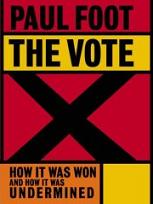
The Vote
Paul Foot
506 pages including index
published in 2005
Paul Foot was one of those supposedly rare people who became socialists early on and remained socialists for the rest of their lives. Throughout his life he kept to his ideals, combining his socialism and activism with his chosen career as an investigative journalist, working for pulications like Private Eye. He died in 2004, having just finished what was to become his last book, this book, The Vote: How it Was Won and How it Was Undermined. As a legacy, there are worse things to leave behind. This is an excellent, informative, angry book, full of heroic struggle and missed chances, with a few moments of thriumph mingled in with long stretches of despair, yet which still manages to find optimism even though the story told is at times very depressing.
That's because Paul Foot's history of how the English won the vote tells, with a monotomous regularity, of how the people rose up against intolerable oppression to fight for their freedoms, had victory in their grasp only to have defeat snatched from the jaws of victory by their leaders. The episode with which Foot starts The Vote is typical. In 1647, after te English Parliament had won the civil war England's king had started, the people's army that won the war thought this meant England would become a true democracy, with a parliament elected by the votes of all men (or even for some, all men and women) in the country. Yet Parliament was still filled with the old aristocracy, wary of democracy and loath to surrender its priviledges. In the first confrontations between Parliament and Army, it seemed the latter would thriumph, yet hesitant to openly wage war against Parliament, it lead itself be moved away from its demands, slowly surrendered its power until by the time it did acted, it's rebellion was easily crushed. Time and again in the history Paul Foot tells this pattern is repeated. Yet despite this, progress is made, forced upon succesive reluctant rulers by the threat of Levellers, Chartists, Suffragettes and others.
The struggle for the vote was determined by two great ideas. On the side of the disenfranchised, the idea was always that once the common people or the workers would have the vote, they could use their newfound power to make the country more equal, to better their own lot. On the side of the people of property, there was the fear that once those without had the vote, the "swinish multitude" would appropriate their property, would end their priviledges. Both sides were wrong.
It turned out that democracy is no threat to property and part two of The Vote, "How the Vote Was Undermined" is an attempt by Foot to explain why that is. Foot himself is not one of those socialists who's dismissive of "bourgeois democracy", he has always believed that democracy was an esssential part of socialism, yet why is it that with the working classes being the most powerful part of society, attempts by those elected as socialist to make society more equal were so difficult, so feeble?
The key insight is that winning the vote and getting your people elected is not enough, when the rest of society is still profoundly undemocratic. Every successive progressive government ran into the fact that outside of Parliament there are a lot of powerful, rich people and institutions not under their control and by their very nature opposed to their goals. As long as their power isn't checked, the room for reform, let alone proper socialism, is limited. Only in exceptional circumstances, such as existed at the end of World War II, can true progress be made. Because the British people had seen the failure of unbridled capitalism in the crisis years of the 1930ties, had fought a terrible war for their very survival, a war many saw not just as a war to defend Britain, but a war to make possible a better Britain, and, most importantly, because those who had fought that war demanded that now the time was come to do just that, it was finally possible to create a state that took care of all its citizens not just the rich. Without World War II, no NHS, no modern welfare state.
Since then of course much terrain has been lost again, as the rich and powerful mounted counteroffensives, broke the back of the unions and finally co-opted the Labour Party. At the start of the 21st century Britain is not only still a nation where the fundamentally inequality is still present, but a nation in which this fundamental inequality has been increased, in which power has steadily moved from democratically elected institutions like Parliament and local councils unto unelected, uncontrolled quangos and PFI partnerships. A depresssing thought, but even though The Vote ends on a low note, at the same time it is a demonstration of how, if people want it, they can create a better society, as long as they realise their power and are not afraid to use it.
In short then, this is an excellent book, depressing at times, but also inspiring. Recommended reading for every socialist.
Read more about:
Paul Foot,
The Vote,
UK politics,
UK history,
social history,
book review